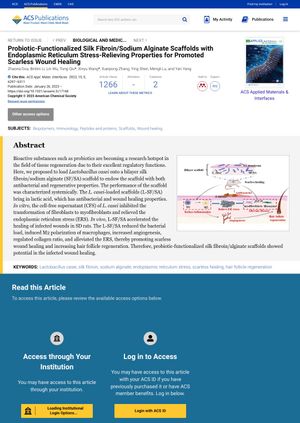Probiotic-Functionalized Silk Fibroin/Sodium Alginate Scaffolds With Endoplasmic Reticulum Stress-Relieving Properties For Promoted Scarless Wound Healing
January 2023
in “
ACS Applied Materials & Interfaces
”

TLDR Probiotic-coated silk/alginate scaffolds help heal wounds faster and with less scarring.
The research paper discusses the use of probiotics, specifically Lactobacillus casei, loaded onto a bilayer silk fibroin/sodium alginate (SF/SA) scaffold to enhance its antibacterial and regenerative properties. The Lactobacillus casei-loaded scaffolds (L-SF/SA) produce lactic acid, which has been found to have antibacterial and wound healing properties. In vitro, the cell-free supernatant (CFS) of L. casei was found to inhibit the transformation of fibroblasts to myofibroblasts and relieve endoplasmic reticulum stress (ERS). In vivo, L-SF/SA accelerated the healing of infected wounds in SD rats, reducing bacterial load, inducing M2 polarization of macrophages, increasing angiogenesis, regulating collagen ratio, and alleviating ERS. This resulted in promoting scarless wound healing and increased hair follicle regeneration. Thus, probiotic-functionalized silk fibroin/alginate scaffolds show potential in healing infected wounds.




